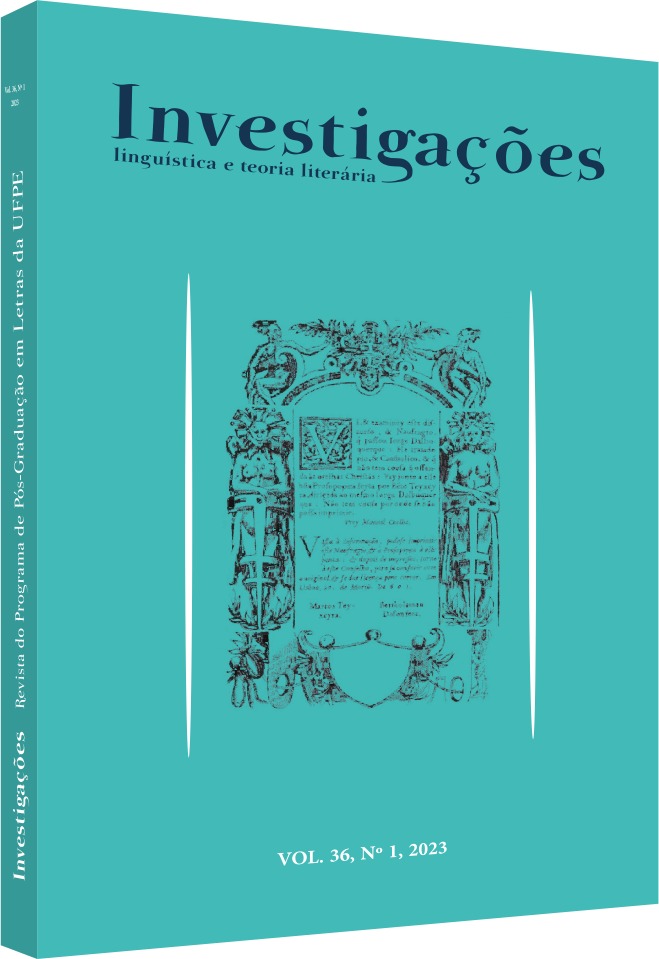Gender, coloniality and the between-place in Pão de Açúcar, by Afonso Reis Cabral
DOI:
https://doi.org/10.51359/2175-294x.2023.258368Keywords:
representation, gender, masculinities, colonialityAbstract
This article offers a perspective on gender representations linked to masculinity and marginality in the novel Pão de Açúcar (2018), which depicts the fictionalization of a hate crime that occurred in Portugal-2006. In that year, Gisberta Salce Júnior, Brazilian transgender woman, was murdered by a group of teenage offenders in the ruins of a supermarket chain. The objective is to understand the representations of the ex-centric subjects in the novel and the colonial narrator’s view of the character Gisberta, through the theoretical framework of Stuart Hall (2016), Pierre Bourdieu (2002), Foucault (2013), Berenice Bento (2015), among others.
References
BENTO, Berenice. Homem não tece a dor: queixas e perplexidades masculinas. Natal: EDUFRN, 2015.
BENTO, Berenice. A Reinvenção do corpo: sexualidade e gênero na experiência transsexual. 3. ed. Salvador: Editora Devires, 2017.
BHABHA, Homi K. A Outra questão: o estereótipo, a discriminação e o discurso do colonialismo. In: BHABHA, Homi K. O Local da cultura. Tradução: de Myriam Ávila, Eliana L. de L. Reis e Gláucia R. Gonçalves. Belo Horizonte: Ed. da UFMG, 1998. p. 105-128.
BOURDIEU, Pierre. Uma ciência que perturba; algumas propriedades dos campos. In: Questões de sociologia. Rio de Janeiro: Marco Zero, 1983. p. 88-94.
BOURDIEU, Pierre. A Dominação masculina. Tradução: Maria Helena Kühner. Rio de Janeiro: Bertrand Brasil, 2002.
CABRAL, Afonso Reis. Pão de Açúcar. Lisboa: Dom Quixote, 2018.
CONNELL, R. W. Masculinities. Berkeley: University of California Press, 1987.
CONNELL, R. W. Políticas da masculinidade. Educação e Realidade, [s. l.], v. 20, n. 2, jul./dez.1995.
FOUCAULT, Michel. História da sexualidade. Rio de Janeiro: Graal, v. 12, 1985.
FOUCAULT, Michel. O corpo utópico, as heterotopias. Tradução: Salma Tannus Muchail. São Paulo: n-1 edições, 2013.
HALL, Stuart. Cultura e representação. Rio de Janeiro: Ed. PUC-Rio: Apicuri, 2016. 260 p.
HUTCHEON, Linda. Poética do pós-modernismo: história, teoria e ficção. Tradução: Ricardo Cruz. Rio de Janeiro: Imago Ed, 1991.
KIMMEL, Michael S. Masculinity as homophobia. In: BROD, Harry; KAUFMAN, Michael (Org.). Theorizing masculinities. New York: Sage Production Editor, 1994. pp.58-70.
LUGONES, María. Colonialidad y género. Tabula Rasa, Bogotá, n. 9, p. 73-101, julio-diciembre, 2008.
RIBEIRO, Djamila. O que é lugar de fala?. Belo Horizonte: Letramento, 2017.
RODRIGUES, Catarina Marques. Gisberta, 10 anos depois: a diva transexual que acabou no fundo do poço. Jornal Observador, Porto (Portugal), 26 fev. 2016. Disponível em: https://observador.pt/especiais/gisberta-10-anos-diva-homofobia-atirou-fundo-do-poco/. Acesso em: 03 mar. 2023.
VALE DE ALMEIDA, Miguel. Senhores de si: uma interpretação antropológica da masculinidade. Lisboa: Fim do Século, 1995.
Downloads
Published
How to Cite
Issue
Section
License
Copyright (c) 2023 João Pedro da Cunha de Almeida

This work is licensed under a Creative Commons Attribution 4.0 International License.
Authors who publish with Revista Investigações agree to the following terms:
Authors retain copyright and grant the journal right of first publication with the work simultaneously licensed under the Creative Commons Attribution 4.0 International (CC BY 4.0) license that allows others to share the work with an acknowledgement of the work's authorship and initial publication in this journal.
Authors are able to enter into separate, additional contractual arrangements for the non-exclusive distribution of the journal's published version of the work (e.g., post it to an institutional repository or publish it in a book), with an acknowledgement of its initial publication in this journal.
You are free to:
Share — copy and redistribute the material in any medium or format for any purpose, even commercially.
Adapt — remix, transform, and build upon the material for any purpose, even commercially.
The licensor cannot revoke these freedoms as long as you follow the license terms.
Under the following terms:
Attribution — You must give appropriate credit , provide a link to the license, and indicate if changes were made . You may do so in any reasonable manner, but not in any way that suggests the licensor endorses you or your use.
No additional restrictions — You may not apply legal terms or technological measures that legally restrict others from doing anything the license permits.

